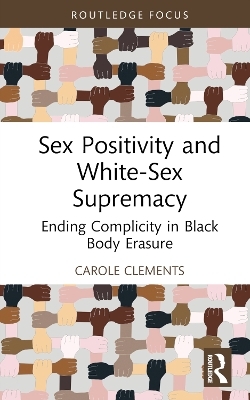
Sex Positivity and White-Sex Supremacy
Ending Complicity in Black Body Erasure
Seiten
2023
Routledge (Verlag)
978-1-032-01575-0 (ISBN)
Routledge (Verlag)
978-1-032-01575-0 (ISBN)
This text critically examines, argues, and demonstrates how the sex positive movement is complicit in the perpetuation of White Supremacy and anti-black bias in the field of human sexualities, offering white sexuality professionals embodied ethical antiracist strategies for sexual inclusion and transformational change.
This text critically examines, argues, and demonstrates how the sex-positive movement is complicit in the perpetuation of White Supremacy and anti-black bias in the field of human sexualities, offering white sexuality professionals embodied ethical antiracist strategies for sexual inclusion and transformational change.
In a world where whiteness is considered the sexual and bodily norm, Carole Clements proposes that the sex-positive movement has failed to examine how it maintains White Supremacy through the guise of inclusivity, and how the lack of a critical understanding of what "sex-positive" means has caused harm to black, indigenous, and people of color (BIPOC) individuals and communities alike. Pivoting away from a sex-positive/sex-negative binary, this book establishes a sex-critical discourse by introducing and operationalizing the term "White-sex Supremacy" to produce a racially just and embodied sexual ethic. Chapters begin by looking at sexual science and its racial origins, recounting how both the science of sex and that of race strived for positivist legitimacy in the same historical moment. Moving from the social construction of racial and sexual hierarchies, chapters look at eugenics and sexology’s early "sex-positive" pioneers, such as Margaret Sanger and Havelock Ellis, before examining the establishment of a race-evasive yet distinctly white sexual normality reliant on sex-positive framing. It shows how sex positivity became a popularized term without a clear definition other than "good," and how the legacy of white fragility leads to complicit white silence and the erasure of Black sexualities. Theoretical, practical, and accessible, it offers tangible methods for white sexuality professionals and scholars to learn accompliceship (over allyship) to promote antiracist sexual justice activism.
This book is essential reading for white sexuality professionals, including sex educators, sex therapists, marriage and family therapists, licensed professional counselors, psychotherapists, gynecologists, and nurses, who are committed to examining their whiteness in the context of their commitment to sex positivity.
This text critically examines, argues, and demonstrates how the sex-positive movement is complicit in the perpetuation of White Supremacy and anti-black bias in the field of human sexualities, offering white sexuality professionals embodied ethical antiracist strategies for sexual inclusion and transformational change.
In a world where whiteness is considered the sexual and bodily norm, Carole Clements proposes that the sex-positive movement has failed to examine how it maintains White Supremacy through the guise of inclusivity, and how the lack of a critical understanding of what "sex-positive" means has caused harm to black, indigenous, and people of color (BIPOC) individuals and communities alike. Pivoting away from a sex-positive/sex-negative binary, this book establishes a sex-critical discourse by introducing and operationalizing the term "White-sex Supremacy" to produce a racially just and embodied sexual ethic. Chapters begin by looking at sexual science and its racial origins, recounting how both the science of sex and that of race strived for positivist legitimacy in the same historical moment. Moving from the social construction of racial and sexual hierarchies, chapters look at eugenics and sexology’s early "sex-positive" pioneers, such as Margaret Sanger and Havelock Ellis, before examining the establishment of a race-evasive yet distinctly white sexual normality reliant on sex-positive framing. It shows how sex positivity became a popularized term without a clear definition other than "good," and how the legacy of white fragility leads to complicit white silence and the erasure of Black sexualities. Theoretical, practical, and accessible, it offers tangible methods for white sexuality professionals and scholars to learn accompliceship (over allyship) to promote antiracist sexual justice activism.
This book is essential reading for white sexuality professionals, including sex educators, sex therapists, marriage and family therapists, licensed professional counselors, psychotherapists, gynecologists, and nurses, who are committed to examining their whiteness in the context of their commitment to sex positivity.
Carole Clements served as Dean of Naropa College for seven years and is Associate Professor of Contemplative Psychology at Naropa University in Boulder, Colorado, teaching graduate and undergraduate courses in Human Sexuality, Dynamics of Intimate Relationships, Erotic Intelligence and Sexual Narratives.
Introduction 1. White Supremacy and Sex: Historicity and Home 2. Ghosts in the Kitchen and the Present Absence of Whiteness 3. Endurance and Erasure 4. Positivity and Time 5. The Making of White sex 6. White-Sex Theater: Sexual Corporeal Theatrics in Splacetime 7. Cultivating Playmind Conclusion
| Erscheinungsdatum | 30.08.2023 |
|---|---|
| Reihe/Serie | Leading Conversations on Black Sexualities and Identities |
| Verlagsort | London |
| Sprache | englisch |
| Maße | 138 x 216 mm |
| Gewicht | 294 g |
| Themenwelt | Geisteswissenschaften ► Psychologie ► Allgemeine Psychologie |
| Geisteswissenschaften ► Psychologie ► Sozialpsychologie | |
| Medizin / Pharmazie ► Medizinische Fachgebiete ► Psychiatrie / Psychotherapie | |
| Sozialwissenschaften ► Ethnologie | |
| Sozialwissenschaften ► Soziologie | |
| ISBN-10 | 1-032-01575-6 / 1032015756 |
| ISBN-13 | 978-1-032-01575-0 / 9781032015750 |
| Zustand | Neuware |
| Haben Sie eine Frage zum Produkt? |
Mehr entdecken
aus dem Bereich
aus dem Bereich
wie Affekte innere Entwicklung ermöglichen
Buch | Softcover (2023)
Klett-Cotta (Verlag)
30,00 €
Buch | Softcover (2024)
Hogrefe Verlag
34,95 €


